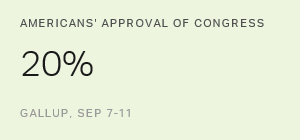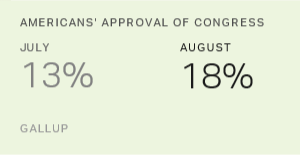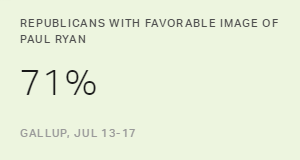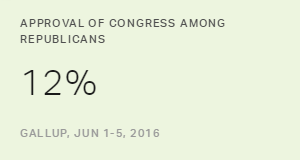Story Highlights
- 20% approval is up slightly from 18% in August
- Democrats' approval up to 30% from 2016 low of 13% in June
- Republicans and independents lower on scale of approval
WASHINGTON, D.C. -- Americans' job approval rating of Congress continues to edge upward to 20% in September, an increase of two percentage points from last month and seven points from July. The 20% mark is notable given that congressional approval has reached this level only three times since 2012.
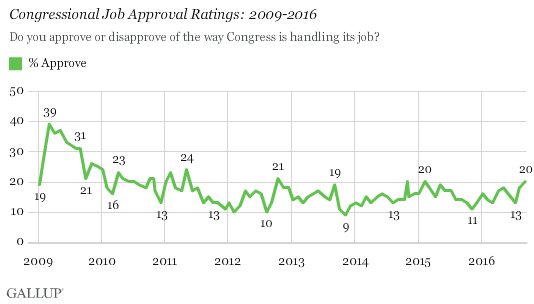
Congressional approval was in the 30% range for the first several months of President Barack Obama's first term in office, before sliding into the 20s later in 2009. Throughout most of his presidency, congressional approval has teetered from the 10s to the 20s, even falling to 9% in November 2013 after the government partially shut down in September. The current 20% reading comes from a Sept. 7-11 Gallup poll.
Democrats Rise Rapidly Since June
At 30%, Democrats' approval of Congress is the highest it has been in the past year and is a marked increase from their 2016 low of 13% recorded in June. Democrats have bounced between the 10s and 20s all year.
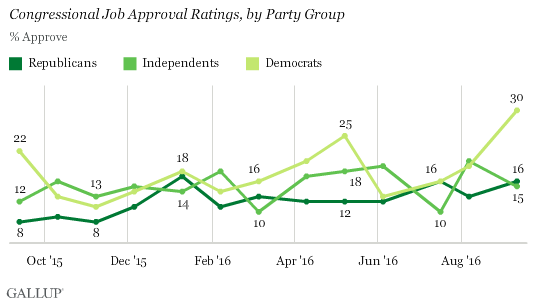
Republicans' approval of Congress, on the other hand, has been mired in the single digits and teens in the past year. At 16%, Republicans' current approval is double what it was one year ago but abysmally low for the party in control of Congress. Historically, Gallup has found that supporters of the majority party in Congress rate the institution much more positively than do nonsupporters of that party. Since taking control of Congress in early 2015, Republicans have expressed frustration with their congressional leaders. Though they view House Speaker Paul Ryan more positively than negatively, the change in speakership last fall has done little to brighten Republicans' outlook.
Independents' approval of Congress is at 15%, down slightly from 20% in August. Approval among those who identify as independents has stayed in a tight 10% to 20% range for the past year.
Bottom Line
Congressional approval is modestly improving, but only one in five Americans say they approve of the legislative branch -- still historically low. With few legislative accomplishments this year, Congress may still fail to inspire Americans to rate the institution highly, even though it has avoided political brinkmanship involving government shutdowns and other budgetary impasses seen in the recent past.
Democrats' improved rating of Congress is more peculiar. It is possible that Democrats may believe the Senate -- and possibly the House -- is in play for a Democratic takeover this fall, fueling a rise in approval of the branch. Since 2009, Democrats have generally been more favorable than Republicans toward Congress, likely because a Democrat is in the White House. The election season has also brought about a decline in congressional activity, including GOP-led attempts to block Obama's agenda.
Republicans' low approval of Congress could reflect frustration with Congress not fulfilling the GOP agenda since Republicans assumed control of the House after the 2010 midterm election.
If there is one party controlling both the executive and legislative branches come January, it is possible that ratings of Congress will improve, as they did at the beginning of Obama's first term, when Democrats also had the majority in both houses of Congress. Many political experts expect Republicans to keep control of the House, so unified control of government is more likely if Republicans maintain their Senate majority and Donald Trump defeats Hillary Clinton.
Historical data are available in Gallup Analytics.
Survey Methods
Results for this Gallup poll are based on telephone interviews conducted Sept. 7-11, 2016, with a random sample of 1,020 adults, aged 18 and older, living in all 50 U.S. states and the District of Columbia. For results based on the total sample of national adults, the margin of sampling error is ±4 percentage points at the 95% confidence level. All reported margins of sampling error include computed design effects for weighting.
Each sample of national adults includes a minimum quota of 60% cellphone respondents and 40% landline respondents, with additional minimum quotas by time zone within region. Landline and cellular telephone numbers are selected using random-digit-dial methods.
View complete question responses and trends.
Learn more about how the Gallup Poll Social Series works.
